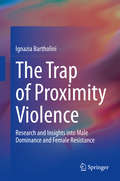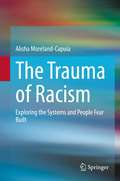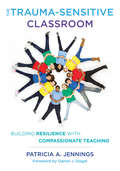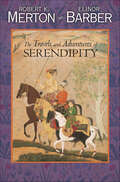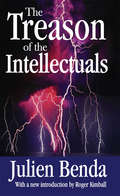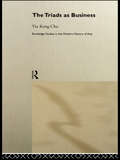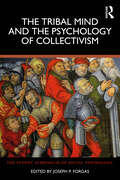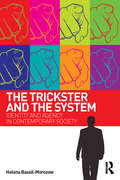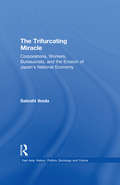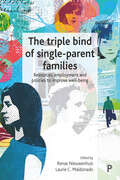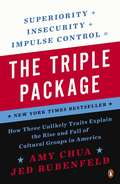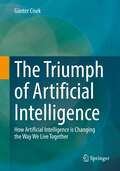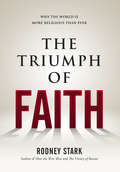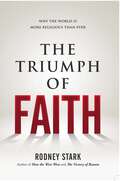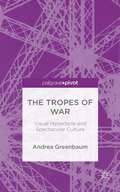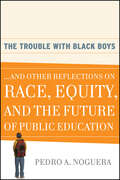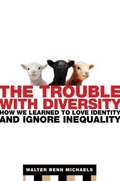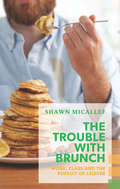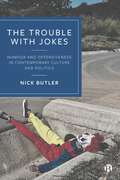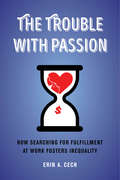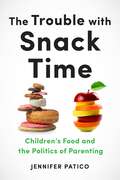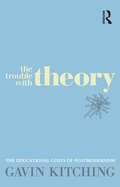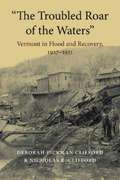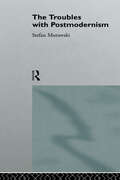- Table View
- List View
The Trap of Proximity Violence: Research and Insights into Male Dominance and Female Resistance
by Ignazia BartholiniThis book aims at shifting the emphasis from a general vision of gender-based violence to a more opaque, yet equally destructive one, that related to "proximity violence".The first type of violence is exercised in multiple situations and in the generality of relationships experienced by people involving others who are both strangers to and intimate with each other. Proximity violence provides and includes a fiduciary kind of "proximity", of "dependent intimacy", where the trust that the victim places in the other (her tormentor) favours the exercise of violence itself, allowing it to take place, thus making it practically imperceptible when not actually normal, in extreme cases.In turn, this confidence is comparable to "a veil of Maja" which, in conditions of vulnerability typical of victims, attenuates the consequences of the violence undergone or the omens of what becomes violent action.The conceptual triad: proximity violence, vulnerability, resistance-resilience is explored here, in the three main chapters and in the details aimed at identifying, in the final chapter, the mutual interconnections. This book will be of particular interest and use to undergraduate and graduate students of sociology and gender studies
The Trauma of Racism: Exploring the Systems and People Fear Built
by Alisha Moreland-CapuiaThis book provides in-depth analysis of the historical, philosophical, anthropological, political and neurobiological reinforcements of fear and the role of fear-on-fear interactions in the construction and maintenance of systems. This text will help systems appreciate the profound, pervasive and deleterious role fear has played in the establishment of laws, policies and practices, and explore what systems can do to reduce fear and prioritize safety and healing. Right now we are dealing with hard truths: human suffering runs deep and is universal; trauma is ubiquitous and widespread; racism is real and has profound psychological, physical, political, social and economic implications; and the world is hurting and needs healing. Many are curious about where and when healing will commence, who will facilitate it and what it will look and feel like. Healing comes in this order: safety, truth and then reconciliation. When we know better, we can (or should) certainly do better. This book offers a framework for how to effectively begin to deconstruct systemic fear, prioritize safety, reduce needless suffering and move toward optimal healing and sustained change.
The Trauma-Sensitive Classroom: Building Resilience With Compassionate Teaching
by Patricia A. Jennings<P><P>From the author of Mindfulness for Teachers, a guide to supporting trauma-exposed students. <P><P> Fully half the students in U.S. schools have experienced trauma, violence, or chronic stress. In the face of this epidemic, it falls increasingly to teachers to provide the adult support these students need to function in school. But most educators have received little training to prepare them for this role. <P><P> In her new book, Tish Jennings—an internationally recognized leader in the field of social and emotional learning—shares research and experiential knowledge about the practices that support students' healing, build their resilience, and foster compassion in the classroom. In Part I, Jennings describes the effects of trauma on body and mind, and how to recognize them in students' behavior. In Part II, she introduces the trauma-sensitive practices she has implemented in her work with schools. And in Part III, she connects the dots between mindfulness, compassion, and resilience. Each chapter contains easy-to-use, practical activities to hone the skills needed to create a compassionate learning environment.
The Travels and Adventures of Serendipity: A Study in Sociological Semantics and the Sociology of Science
by Robert K. Merton Elinor BarberFrom the names of cruise lines and bookstores to an Australian ranch and a nudist camp outside of Atlanta, the word serendipity--that happy blend of wisdom and luck by which something is discovered not quite by accident--is today ubiquitous. This book traces the word's eventful history from its 1754 coinage into the twentieth century--chronicling along the way much of what we now call the natural and social sciences. The book charts where the term went, with whom it resided, and how it fared. We cross oceans and academic specialties and meet those people, both famous and now obscure, who have used and abused serendipity. We encounter a linguistic sage, walk down the illustrious halls of the Harvard Medical School, attend the (serendipitous) birth of penicillin, and meet someone who "manages serendipity" for the U.S. Navy. The story of serendipity is fascinating; that of The Travels and Adventures of Serendipity, equally so. Written in the 1950s by already-eminent sociologist Robert Merton and Elinor Barber, the book--though occasionally and most tantalizingly cited--was intentionally never published. This is all the more curious because it so remarkably anticipated subsequent battles over research and funding--many of which centered on the role of serendipity in science. Finally, shortly after his ninety-first birthday, following Barber's death and preceding his own by but a little, Merton agreed to expand and publish this major work. Beautifully written, the book is permeated by the prodigious intellectual curiosity and generosity that characterized Merton's influential On the Shoulders of Giants. Absolutely entertaining as the history of a word, the book is also tremendously important to all who value the miracle of intellectual discovery. It represents Merton's lifelong protest against that rhetoric of science that defines discovery as anything other than a messy blend of inspiration, perspiration, error, and happy chance--anything other than serendipity.
The Treason of the Intellectuals
by Roger Kimball Julien BendaJulien Benda's classic study of 1920s Europe resonates today. The "treason of the intellectuals" is a phrase that evokes much but is inherently ambiguous. The book bearing this title is well known but little understood. This edition is introduced by Roger Kimball. From the time of the pre-Socratics, intellectuals were a breed apart. They were non-materialistic knowledge-seekers who believed in a universal humanism and represented a cornerstone of civilized society. According to Benda, this all began to change in the early twentieth century. In Europe in the 1920s, intellectuals began abandoning their attachment to traditional philosophical and scholarly ideals, and instead glorified particularisms and moral relativism. The "treason" of which Benda writes is the betrayal by the intellectuals of their unique vocation. He criticizes European intellectuals for allowing political commitment to insinuate itself into their understanding of the intellectual vocation, ushering the world into "the age of the intellectual organization of political hatreds." From the savage flowering of ethnic and religious hatreds in the Middle East and throughout Europe today to the mendacious demand for political correctness and multiculturalism on college campuses everywhere in the West, the treason of the intellectuals continues to play out its unedifying drama.
The Triads as Business (Routledge Studies in the Modern History of Asia #No.6)
by Yiu-kong ChuThere is no doubt that the triads have become recognized as a sophisticated and international criminal force and, following the handover of Hong Kong to China, there have been increasing fears that their influence will spread to the West through emigration. This book investigates the reality behind the myth with a study of the Hong Kong triads, generally regarded as the headquarters of triad societies throughout the world. Yiu Kong Chu examines their origins, their organized extortion from legitimate businesses large and small, and their more recent moves into illegal activities such as drug trafficking, human smuggling and gambling.Contrary to the popular belief that Hong Kong triads are replacing the Italian Mafia as the most powerful criminal organization in the world, this book argues that Hong Kong triads may be declining, as other ethnic Chinese crime gangs emerge as powerful crime groups in Western societies.Based on interviews with ex triad members and victims of the triads, police from Hong Kong, mainland China and Europe, as well as documentary evidence The Triads as Business gives a vivid and compelling picture of the triads as part of a wider society.
The Trials of Academe: The New Era of Campus Litigation
by Amy GajdaOnce upon a time, virtually no one in the academy thought to sue over campus disputes, and, if they dared, judges bounced the case on grounds that it was no business of the courts. Tenure decisions, grading curves, course content, and committee assignments were the stuff of faculty meetings, not lawsuits. Not so today. As Amy Gajda shows in this witty yet troubling book, litigation is now common on campus, and perhaps even more commonly feared. Professors sue each other for defamation based on assertions in research articles or tenure review letters; students sue professors for breach of contract when an F prevents them from graduating; professors threaten to sue students for unfairly criticizing their teaching. Gajda’s lively account introduces the new duo driving the changes: the litigious academic who sees academic prerogative as a matter of legal entitlement and the skeptical judge who is increasingly willing to set aside decades of academic deference to pronounce campus rights and responsibilities. This turn to the courts is changing campus life, eroding traditional notions of academic autonomy and confidentiality, and encouraging courts to micromanage course content, admissions standards, exam policies, graduation requirements, and peer review. This book explores the origins and causes of the litigation trend, its implications for academic freedom, and what lawyers, judges, and academics themselves can do to limit the potential damage.
The Tribal Mind and the Psychology of Collectivism (Sydney Symposium of Social Psychology)
by Joseph P. ForgasTribalism is a key evolutionary feature of humans, and the recent growth in tribal polarisation presents a serious challenge to our highly individualistic civilisation. This fascinating book examines the psychological origins and consequences of tribalism both in our private and in our public lives.The chapters explore how social, evolutionary, biological, and cognitive factors shape our tribal habits, featuring contributions from eminent international researchers. The chapters review the nature and origins of tribalism, the psychological mechanisms promoting tribalism, how tribal narratives can distort rationality and perceptions of reality, and the role of tribalism in politics and public affairs. The contributions investigate how insecurity, the search for meaning and attachment, victimhood, grievance, and cognitive shortcomings can facilitate tribal bonding and how such groups once formed can foster conflict, hatred, and irrational behaviours. The book suggests that the survival of our extremely successful civilisation based on the enlightenment values of liberty and individualism may well depend on our ability to understand and manage the human evolutionary propensity for tribalism.The book will be of great interest to students and researchers in psychology, sociology, and other disciplines of behavioural and social sciences, as well as all readers who seek to understand one of the most intriguing issues that shape human social life.
The Trickster and the System: Identity and agency in contemporary society
by Helena Bassil-MorozowFor centuries, the trickster has been used in various narratives, including mythological, literary and cinematic, to convey the idea of agency, rebellion and, often turbulent, progress. In The Trickster and the System: Identity and Agency in Contemporary Society, Helena Bassil-Morozow shows how the trickster can be seen as a metaphor to describe the psycho-anthropological concept of change, an impulse that challenges the existing order of things, a progressive force that is a-structural and anti-structural in its nature. The book is about being able to see things from an unusual, even ‘odd’, perspective, which does not coincide with the homogenous normality of the mass, or the social system, or a political ideology, or some other kind of authority. The Trickster and the System offers an analytical paradigm which can be used to examine relationships between tricksters and systems, change and stability, in a wide range of social, political and cultural contexts. It covers a range of systems, describes different types of tricksters and discusses possible conflicts, tensions and dialogues between the two opposing sides. One of the central ideas of the book is that social systems use shame as a tool to control and manage all kinds of tricksters – individuality, agency, creativity, spontaneity, innovation and initiative, to name but a few. The author argues that any society that neglects its tricksters (agents of change), ends up suffering from decay, stagnation – or even mass hysterical outbursts. The Trickster and the System: Identity and Agency in Contemporary Society provides a fresh perspective on the trickster figure in a variety of cultural contexts. It covers a range of psychological, cultural, social and political phenomena, from personal issues to the highest level of society’s functioning: self-esteem and shame, lifestyle and relationships, creativity and self-expression, media, advertising, economy, political ideology and, most importantly, human identity and authenticity. The book is essential reading for scholars in the areas of psychoanalysis, analytical psychology, myth, cultural and media studies, narrative analysis, cultural anthropology, as well as anyone interested in critical issues in contemporary culture. Helena Bassil-Morozow is a cultural philosopher, film scholar and academic writer whose many publications include Tim Burton: The Monster and the Crowd (Routledge, 2010) and The Trickster in Contemporary Film (Routledge, 2011). Helena is currently working on another Routledge project, Jungian Film Studies: the Essential Guide (co-authored with Luke Hockley). Her principal academic affiliation is the University of Bedfordshire, Faculty of Creative Arts, Technologies & Science.
The Trifurcating Miracle: Corporations, Workers, Bureaucrats, and the Erosion of Japan's National Economy (East Asia: History, Politics, Sociology and Culture)
by Satoshi IkedaFirst published in 2002. Routledge is an imprint of Taylor & Francis, an informa company.
The Triple Bind of Single-Parent Families: Resources, Employment and Policies to Improve Wellbeing
by Rense Nieuwenhuis Laurie C. MaldonadoAvailable Open Access under CC-BY-NC licence. Single parents face a triple bind of inadequate resources, employment, and policies, which in combination further complicate their lives. This book - multi-disciplinary and comparative in design - shows evidence from over 40 countries, along with detailed case studies of Sweden, Iceland, Scotland, and the UK. It covers aspects of well-being that include poverty, good quality jobs, the middle class, wealth, health, children’s development and performance in school, and reflects on social justice. Leading international scholars challenge our current understanding of what works and draw policy lessons on how to improve the well-being of single parents and their children.
The Triple Package: How Three Unlikely Traits Explain the Rise and Fall of Cultural Groups in America
by Amy Chua"That certain groups do much better in America than others -- as measured by income, occupational status, test scores, and so on -- is difficult to talk about. In large part this is because the topic feels racially charged. The irony is that the facts actually debunk racial stereotypes. There are black and Hispanic subgroups in the United States far outperforming many white and Asian subgroups. Moreover, there's a demonstrable arc to group success -- in immigrant groups, it typically dissipates by the third generation -- puncturing the notion of innate group differences and undermining the whole concept of 'model minorities. '" Mormons have recently risen to astonishing business success. Cubans in Miami climbed from poverty to prosperity in a generation. Nigerians earn doctorates at stunningly high rates. Indian and Chinese Americans have much higher incomes than other Americans; Jews may have the highest of all. Why do some groups rise? Drawing on groundbreaking original research and startling statistics, The Triple Package uncovers the secret to their success. A superiority complex, insecurity, impulse control -- these are the elements of the Triple Package, the rare and potent cultural constellation that drives disproportionate group success. The Triple Package is open to anyone. America itself was once a Triple Package culture. It's been losing that edge for a long time now. Even as headlines proclaim the death of upward mobility in America, the truth is that the oldfashioned American Dream is very much alive, but some groups have a cultural edge, which enables them to take advantage of opportunity far more than others. * Americans are taught that everyone is equal, that no group is superior to another. But remarkably, all of America's most successful groups believe (even if they don't say so aloud) that they're exceptional, chosen, superior in some way. * Americans are taught that self-esteem -- feeling good about yourself -- is the key to a successful life. But in all of America's most successful groups, people tend to feel insecure, inadequate, that they have to prove themselves. * America today spreads a message of immediate gratification, living for the moment. But all of America¿s most successful groups cultivate heightened discipline and impulse control. But the Triple Package has a dark underside too. Each of its elements carries distinctive pathologies; when taken to an extreme, they can have truly toxic effects. Should people strive for the Triple Package? Should America? Ultimately, the authors conclude that the Triple Package is a ladder that should be climbed and then kicked away, drawing on its power but breaking free from its constraints. Provocative and profound, The Triple Package will transform the way we think about success and achievement.
The Triumph of Artificial Intelligence: How Artificial Intelligence is Changing the Way We Live Together
by Günter CisekThe book demonstrates to readers interested in social life in an understandable way how AI works and how it will dramatically change all areas of life. From the history of AI to its techniques and its diverse fields of application to its ethical-philosophical implications, all relevant aspects are presented in detail. The author does not remain descriptive, but also takes a critical stance on AI development in clear words. For the reader, the explanations are designed as a professional support corset, in order to be able to act as a knowledgeable counterpart to the AI experts. The last two chapters take the reader into the future of life with super AI. With daring scenarios, the author alerts the reader in an enjoyable way to the breathtaking and socially highly explosive perspectives associated with AI and the ethical and philosophical questions that arise from it.This book is a translation of the original German 1st edition Machtwechsel der Intelligenzen by Günter Cisek, published by Springer Fachmedien Wiesbaden GmbH, part of Springer Nature in 2021. The translation was done with the help of artificial intelligence (machine translation by the service DeepL.com). A subsequent human revision was done primarily in terms of content, so that the book will read stylistically differently from a conventional translation. Springer Nature works continuously to further the development of tools for the production of books and on the related technologies to support the authors.
The Triumph of Faith
by Rodney StarkTheTriumph of Faith explodes the myth that people around the world are abandoning religion. Stark marshals an incredible amount of data--surveys of more than a million people in 163 nations--to paint the full picture that both scholars and popular commentators have missed. He explains why the astonishing growth of religion is happening, and what it means for our future. Stark's lively, eye-opening book is full of insights that defy the conventional wisdom. He reveals: * Why Islam is not overtaking Christianity * 81 percent of people around the world claim to belong to an organized religious faith * Half of the people around the world attended a worship service in the past week * Despite all the attention paid to the "New Atheists," atheists remain few, anywhere * Latin America has never been so Catholic--and that's because there are now so many Protestants there * Of all the great world religions, only Buddhism may not be growing As Stark shows, secularists have been predicting the imminent demise of religion for centuries. It is their unshakeable faith in secularization that may be the most "irrational" of all.
The Triumph of Faith: Why the World Is More Religious than Ever
by Rodney Stark"God is not dead." —Wall Street Journal Believe it or not, the world is more religious than ever before. Everyone seems to take it for granted that the world is getting more secular—that faith is doomed by modernity. Scientists, secularists, and atheists applaud the change; religious believers lament it. But here's the thing: they're all wrong—and the bestselling author and influential scholar of religion Rodney Stark has the numbers to prove it.The Triumph of Faith explodes the myth that people around the world are abandoning religion. Stark marshals an unprecedented body of data—surveys of more than a million people in 163 nations—to paint the full picture that both scholars and popular commentators have missed. And he explains why the astonishing growth of religion is happening and what it means for our future. Stark's bracing book is full of insights that defy the conventional wisdom. With vigorous prose he reveals: •Why claims about Millennials' lack of religion are overblown and historically ignorant •Why Islam is NOT overtaking Christianity •How 4 out of 5 people worldwide now belong to an organized religion •How 50 percent have attended a worship service in the past week •Why much-ballyhooed studies from the Pew Research Center and others get the religious landscape wrong •Why atheists remain few, anywhere—despite all the talk of the "New Atheism" As Stark shows, secularists have been predicting the imminent demise of religion for centuries. It is their unshakable faith in secularization that may be the most "irrational" of all beliefs. As the author of How the West Won, The Victory of Reason, and many other bestselling works, Rodney Stark has a richly deserved reputation for writing page-turning, myth-busting books. He is also a groundbreaking scholar who has so reshaped the social scientific study of religion that his work has become the basis of a "new paradigm." Stark puts all those talents on full display in The Triumph of Faith.This book will change how you see both religion and the forces of secularization.
The Trouble With Black Boys
by Pedro A. NogueraFor many years to come, race will continue to be a source of controversy and conflict in American society. For many of us it will continue to shape where we live, pray, go to school, and socialize. We cannot simply wish away the existence of race or racism, but we can take steps to lessen the ways in which the categories trap and confine us. Educators, who should be committed to helping young people realize their intellectual potential as they make their way toward adulthood, have a responsibility to help them find ways to expand identities related to race so that they can experience the fullest possibility of all that they may become. In this brutally honest--yet ultimately hopeful-- book Pedro Noguera examines the many facets of race in schools and society and reveals what it will take to improve outcomes for all students. From achievement gaps to immigration, Noguera offers a rich and compelling picture of a complex issue that affects all of us.
The Trouble With Diversity: How We Learned to Love Identity and Ignore Inequality
by Walter Benn MichaelsA brilliant assault on our obsession with every difference except the one that really matters - the difference between rich and poor If there's one thing Americans agree on, it's the value of diversity. Our corporations vie for slots in the Diversity Top 50, our universities brag about minority recruiting, and every month is Somebody's History Month. But in this provocative new book, Walter Benn Michaels argues that our enthusiastic celebration of "difference" masks our neglect of America's vast and growing economic divide. Affirmative action in schools has not made them more open, it's just guaranteed that the rich kidscome in the appropriate colors. Diversity training in the workplace has not raised anybody's salary (except maybe the diversity trainers') but it has guaranteed that when your job is outsourced, your culture will be treated with respect. With lacerating prose and exhilarating wit, Michaels takes on the many manifestations of our devotion to diversity, from companies apologizing for slavery, to a college president explaining why there aren't more women math professors, to the codes of conduct in the new "humane corporations. " Looking at the books we read, the TV shows we watch, and the lawsuits we bring, Michaels shows that diversity has become everyone's sacred cow precisely because it offers a false vision of social justice, one that conveniently costs us nothing. The Trouble with Diversity urges us to start thinking about real justice, about equality instead of diversity. Attacking both the right and the left, it will be the most controversial political book of the year.
The Trouble with Brunch: Work, Class and the Pursuit of Leisure (Exploded Views)
by Shawn MicallefOne of The Globe and Mail's Globe 100: Best Books of 2014 Every weekend, in cities around the world, bleary-eyed diners wait in line to be served overpriced, increasingly outré food by hungover waitstaff. For some, the ritual we call brunch is a beloved pastime; for others, a bedeviling waste of time. But what does its popularity say about shifting attitudes towards social status and leisure? In some ways, brunch andother forms of conspicuous consumption have blinded us to ever-more-precarious employment conditions. For award-winning writer and urbanist Shawn Micallef, brunch is a way to look more closely at the nature of work itself and a catalyst for solidarity among the so-called creative class. Drawing on theories from Thorstein Veblen to Richard Florida, Micallef traces his own journey from the rust belt to a cosmopolitan city where the evolving middle class he joined was obliviousto its own instability and insularity. The Trouble with Brunch is a provocative analysis of foodie obsession and status anxiety, but it's also a call to reset our class consciousness. The real trouble with brunch isn't so much bad service and outsized portions of bacon, it's that brunch could be so much more. 'At the crux of it, Micallef's issue with brunch is a lack of self-awareness, and his book is essentially a call to arms to consider the implications of one's actions, even for something as innocuous as meeting friends for eggs and mimosas.' – Bookslut Praise for Shawn Micallef: ‘As Toronto grows into a more mature, more compelling city, a new group of non-academic, street-smart urbanists has emerged to appreciate it – with-it young writers, architects and men and women about town who love big cities and see things in Toronto that most of usmiss. Shawn Micallef is one of the sharpest of this sharp-eyed breed.’ – Globe and Mail ‘A smart and intimate guide to the city that makes you feel like an insider from start to finish.’ – Douglas Coupland [on Stroll]
The Trouble with Jokes: Humour and Offensiveness in Contemporary Culture and Politics
by Nick ButlerWe’re accustomed to seeing humour as a diversion from the serious side of life, but humour also permeates some of the most troubling political developments in recent years. From the resurgence of white nationalism to the erosion of democratic norms, jokes force-feed us objectionable ideologies while we gasp and splutter at all the side-splitting shenanigans. This book explores the relationship between humour and offensiveness in contemporary society. Drawing on examples from philosophical thinkers and popular culture, it invites readers to consider the dark side of humour. Weaving together cultural analysis, political discussion and philosophical reflection, the book provides an antidote to positive thinking about laughter and a roadmap for navigating different types of offensive humour.
The Trouble with Passion: How Searching for Fulfillment at Work Fosters Inequality
by Erin CechProbing the ominous side of career advice to "follow your passion," this data-driven study explains how the passion principle fails us and perpetuates inequality by class, gender, and race; and it suggests how we can reconfigure our relationships to paid work. "Follow your passion" is a popular mantra for career decision-making in the United States. Passion-seeking seems like a promising path for avoiding the potential drudgery of a life of paid work, but this "passion principle"—seductive as it is—does not universally translate. The Trouble with Passion reveals the significant downside of the passion principle: the concept helps culturally legitimize and reproduce an exploited, overworked white-collar labor force and broadly serves to reinforce class, race, and gender segregation and inequality. Grounding her investigation in the paradoxical tensions between capitalism's demand for ideal workers and our cultural expectations for self-expression, sociologist Erin A. Cech draws on interviews that follow students from college into the workforce, surveys of US workers, and experimental data to explain why the passion principle is such an attractive, if deceptive, career decision-making mantra, particularly for the college educated. Passion-seeking presumes middle-class safety nets and springboards and penalizes first-generation and working-class young adults who seek passion without them. The ripple effects of this mantra undermine the promise of college as a tool for social and economic mobility. The passion principle also feeds into a culture of overwork, encouraging white-collar workers to tolerate precarious employment and gladly sacrifice time, money, and leisure for work they are passionate about. And potential employers covet, but won't compensate, passion among job applicants. This book asks, What does it take to center passion in career decisions? Who gets ahead and who gets left behind by passion-seeking? The Trouble with Passion calls for citizens, educators, college administrators, and industry leaders to reconsider how we think about good jobs and, by extension, good lives.
The Trouble with Snack Time: Children’s Food and the Politics of Parenting
by Jennifer PaticoUncovers the class and race dimensions of the "cupcake wars"In the wake of school-lunch reform debates, heated classroom cupcake wars, and concerns over childhood obesity, the diet of American children has become a “crisis” and the cause of much anxiety among parents. Many food-conscious parents are well educated, progressive and white, and while they may explicitly value race and class diversity, they also worry about less educated or less well-off parents offering their children food that is unhealthy. Jennifer Patico embedded herself in an urban Atlanta charter school community, spending time at school events, after-school meetings, school lunchrooms, and private homes. Drawing on interviews and ethnographic observation, she details the dilemma for parents stuck between a commitment to social inclusion and a desire for control of their children’s eating. Ultimately, Patico argues that the attitudes of middle-class parents toward food reflect an underlying neoliberal capitalist ethic, in which their need to cultivate proper food consumption for their children can actually work to reinforce class privilege and exclusion.Listening closely to adults' and children's food concerns, The Trouble with Snack Time explores those unintended effects and suggests how the "crisis" of children’s food might be reimagined toward different ends.
The Trouble with Theory: The educational costs of postmodernism
by Gavin KitchingPostmodern theory has engaged the hearts and heads of the brightest students because of its apparent political and social radicalism. Despite this Professor Gavin Kitching claims that, 'At the heart of postmodernism is very poor, deeply confused and misbegotten philosophy. As a result even the very best students who fall under its sway produce radically incoherent ideas about language, meaning, truth and reality.'This is not another conservative attack on postmodernism. Rather, it is a carefully considered analysis from a dedicated university teacher who is convinced that we have gone terribly astray. He shows that postmodern theory is at best irrelevant to, and at worst undermining of, persuasive political arguments, and reveals the basic philosophical confusion at its heart which makes this so. Essential reading for any student writing a thesis in the humanities and the social sciences, and for their teachers.'It is the strongest and best attack on the ravages of routine post-modernism that I have ever read. I applaud the way he lists the good causes that students warmly espouse, and then suggests a simpler way to support them without the self-destructive it's all just language that is implicit in their work.' - Professor Sir Bernard Crick, Emeritus Professor of Politics, Birkbeck College, University of London'Gavin Kitching rattles the cages. Will the inmates hear this? They should, if only for the reason that there is virtue in learning to argue against yourself. This is a serious book.' - Professor Peter Beilharz, Sociology, La Trobe University'Required reading for anyone who wants to understand how and why postmodernism has had such disastrous pedagogical consequences.' - Professor David G. Stern, Philosophy, University of Iowa
The Troubled Roar Of The Waters: Vermont In Flood And Recovery, 1927-1931
by Deborah Pickman Clifford Nicholas R. CliffordIn their new book, Deborah Pickman Clifford and Nicholas R. Clifford revisit the devastating flood that wreaked unprecedented destruction on New England in November 1927. Vermont sustained the greatest damage by far, with eighty-four deaths (or three-quarters of the total casualties) and property losses totaling thirty to forty million in 1927 dollars (more than eighty-six dollars for every man, woman, and child then in the state). These losses were proportionally far higher than the corresponding ones suffered in the regions ravaged by the huge Mississippi floods earlier that year. In these pre-FEMA years and in true Green Mountain State style, Vermonters by and large had to confront the emergency on their own, and this at a time when the boom of the mid and late 1920s had largely bypassed Vermont, a rural state with little industry and a stagnant population. Contrary to popular belief, however,Vermont did accept federal, Red Cross, and other outside assistance. "The Troubled Roar of the Waters" is the story of the flood, the formation and work of emergency relief committees, the efforts to rebuild in a harsh climate, and the ways in which the disaster fundamentally affected the state's political and social development. Though the 1920s traditionally have been represented primarily as a prelude to the Depression and the New Deal, new scholarship sees the nation entering a period of rapid and unnerving change in these years. Cities and suburbs mushroomed, the automobile revolutionized society, new and larger forms of business and industry flourished, and tensions mounted between new immigrants and the "old stock. " The Cliffords build on this, using public and private archival collections to inform their riveting story, fleshing out the historical record and adding key perspectives to this broader emerging debate over how the decade is viewed. For specialists and general readers alike, the authors place the story of the 1927 flood within the larger context of early twentieth-century American history, establishing the event and its aftermath as emblematic of the age.
The Troubles With Postmodernism
by Stefan MorawskiIn this original and eye-opening study, Stefan Morawski sheds light on the often confused debate about postmodernism, postmodernity and human values. Drawing upon a wide range of evidence from the experience of everyday life in the sciences, religion, visual arts, literature, film, television and contemporary music, The Troubles with Postmodernism is an indispensable guide to our understanding and evaluation of contemporary literature.
